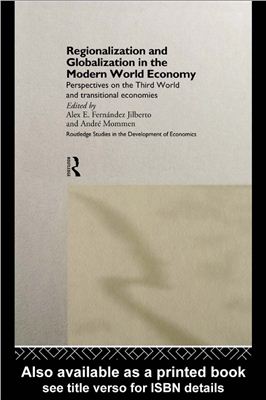Routledge, 1998. 366 p.
This collection of outstanding essays explores the importance of regionalization and globalization to the world economy. Inteational contributions explore the process of regionalization in the Pacific Area, the Americas, Africa and Europe, and question whether the world economy is characterized by increasing regionalization, rather than globalization.
Contributors investigate:
how the processes of globalization and regionalization, driven by liberalization of trade and capital markets, weaken nationally established monopolies and protected industries;
whether globalization and regionalization are a challenge to Third World nations and the countries of the former socialist bloc, because they threaten exclusion from the developed industrialized world’s free trade blocs;
the possibility that regionalization creates obstacles for an integrated inteational economy. Will the world trading system fragment due to Europe, North Amercia and Pacific Asia creating a tripolar economic system?
Regionalization and Globalization in the Mode World Economy makes an important contribution to current debates on development economics.
Globalization versus regionalization
Exteal pressures shaping regionalism: a critical assessment
Central and Easte Europe: catching up or marginalization in the European free trade zone?
Economic reform and new pattes of post-Soviet regionalism
Preparing the Russian economy for world market integration
Regional economic integration in Sub-Saharan Africa
The European Union and its expanding easte and southe borders
A regionalizing middle power: Turkey’s role between Europe and Asia
Morocco’s economy between the Maghreb and Europe
Regional integration processes in Latin America: Argentina and MERCOSUR
The politics of open regionalism and neo-liberal economic integration in Latin America: the case of Chile and Mexico
Trade liberalization and economic integration in Central America
Association of the South-East Asian Nations’ (ASEAN) Free Trade Area (AFTA): the changing environment and incentives
Exteal liberalization, regionalization and openness in Indochina’s economic transformation
This collection of outstanding essays explores the importance of regionalization and globalization to the world economy. Inteational contributions explore the process of regionalization in the Pacific Area, the Americas, Africa and Europe, and question whether the world economy is characterized by increasing regionalization, rather than globalization.
Contributors investigate:
how the processes of globalization and regionalization, driven by liberalization of trade and capital markets, weaken nationally established monopolies and protected industries;
whether globalization and regionalization are a challenge to Third World nations and the countries of the former socialist bloc, because they threaten exclusion from the developed industrialized world’s free trade blocs;
the possibility that regionalization creates obstacles for an integrated inteational economy. Will the world trading system fragment due to Europe, North Amercia and Pacific Asia creating a tripolar economic system?
Regionalization and Globalization in the Mode World Economy makes an important contribution to current debates on development economics.
Globalization versus regionalization
Exteal pressures shaping regionalism: a critical assessment
Central and Easte Europe: catching up or marginalization in the European free trade zone?
Economic reform and new pattes of post-Soviet regionalism
Preparing the Russian economy for world market integration
Regional economic integration in Sub-Saharan Africa
The European Union and its expanding easte and southe borders
A regionalizing middle power: Turkey’s role between Europe and Asia
Morocco’s economy between the Maghreb and Europe
Regional integration processes in Latin America: Argentina and MERCOSUR
The politics of open regionalism and neo-liberal economic integration in Latin America: the case of Chile and Mexico
Trade liberalization and economic integration in Central America
Association of the South-East Asian Nations’ (ASEAN) Free Trade Area (AFTA): the changing environment and incentives
Exteal liberalization, regionalization and openness in Indochina’s economic transformation

